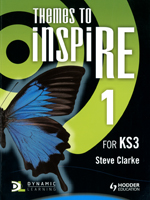Themes to Inspire 1
Dynamic Learning
By Steve Clarke
May 2011
Hodder Education
Distributed by Trans-Atlantic Publications
ISBN: 9781444122053
96 pages, Illustrated
$39.50 paper original
InspiRE is the first Key Stage 3 course that lets you to teach RE both thematically, and/or, by religion, giving you the flexibility to deliver lessons however you want.
InspiRE comprises two parallel sets of books: Themes to Inspire, three books, one for each year of KS3, that cover the National Curriculum programme of study through an exploration of thematic issues and concepts; and Religions to Inspire, seven 'by religion' books that exemplify the themes and expands them from the points of view of the major religions of Great Britain. The flexibility and customisation that this approach offers teachers and syllabus designers is unique.
Themes to Inspire 1, the first book in the series, explores concepts like: 'Who am I?' 'Who or what is God?' 'How did religion develop?' and 'Why is forgiveness important?'
Key features:
- Engaging pupil-centred activities incorporate assessment for learning (AFL) and personal learning and thinking skills (PLTS), providing complete and comprehensive coverage of the programme of study for religious education.
- Offering clear differentiation with levelled activities referenced against the eight-level scale. These allow pupils to work at their level and understand see what they have to do to progress, along with extension activities to challenge more able pupils.
- The 'Big Assignment' at the end of each section provides teachers with formative assessment opportunities.
- Provides guidance and support for teachers in the Teacher's Resource Book to help you plan, teach and assess learning.
- Features engaging and integrated ICT resources with lessons delivered through our digital platform, Dynamic Learning.
- An innovative and unique course, allowing the flexibility to combine exploration of themes with more in-depth coverage of the major religions.
- Activities incorporate the requirements of assessment for learning (AFL) and the Big Assignment at the end of each section covers the requirements of personal learning and thinking skills (PLTS), providing formative assessment opportunities.
- Differentiation is tackled within activities. Each activity is levelled, and guidance and support for assessment and levelling, along with extension activities to challenge more able pupils, are provided in the Teacher's Resource Book.
- Tailored both for the non-specialist and time-strapped RE teacher, this course helps teachers plan, teach and assess learning. It offers an unbeatable combination of time-saving lesson plans, guidance and support, stress-free assessment and levelling, and AFL and PLTS fulfilment with differentiated activities.
- ICT is integral to every lesson, with lessons delivered through our popular Dynamic Learning platform.
Table of Contents:
![]() Section 1 - EXPRESSIONS OF FAITH
Section 1 - EXPRESSIONS OF FAITH
![]() 1.1 How are symbols used in religion?
1.1 How are symbols used in religion?
![]() 1.2 How did the religions start?
1.2 How did the religions start?
![]() 1.3 What makes a good teacher?
1.3 What makes a good teacher?
![]() 1.4 What do non-Christian religions think about Jesus?
1.4 What do non-Christian religions think about Jesus?
![]() 1.5 How do the religions use symbols in art?
1.5 How do the religions use symbols in art?
![]() 1.6 What will you find in a place of worship?
1.6 What will you find in a place of worship?
![]() 1.7 What will you find in the homes of some religious people?
1.7 What will you find in the homes of some religious people?
![]() 1.8 How did the religions develop?
1.8 How did the religions develop?
![]() The big assignment
The big assignment
![]() Section 2 - BELIEFS ABOUT MEANING AND PURPOSE
Section 2 - BELIEFS ABOUT MEANING AND PURPOSE
![]() 2.1 Who am I?
2.1 Who am I?
![]() 2.2 Where do I belong?
2.2 Where do I belong?
![]() 2.3 What is faith?
2.3 What is faith?
![]() 2.4 What is religion?
2.4 What is religion?
![]() 2.5 Who or what is God?
2.5 Who or what is God?
![]() 2.6 What is life?
2.6 What is life?
![]() 2.7 Did the universe have a beginning?
2.7 Did the universe have a beginning?
![]() 2.8 Will the universe have an end?
2.8 Will the universe have an end?
![]() The big assignment
The big assignment
![]() Section 3 - ETHICS AND VALUES
Section 3 - ETHICS AND VALUES
![]() 3.1 How do we know right from wrong?
3.1 How do we know right from wrong?
![]() 3.2 What makes something good?
3.2 What makes something good?
![]() 3.3 What is the Golden Rule?
3.3 What is the Golden Rule?
![]() 3.4 What is a moral dilemma?
3.4 What is a moral dilemma?
![]() 3.5 How can you solve a moral dilemma?
3.5 How can you solve a moral dilemma?
![]() 3.6 What is love?
3.6 What is love?
![]() 3.7 What is justice?
3.7 What is justice?
![]() 3.8 Why is forgiveness important?
3.8 Why is forgiveness important?
![]() The big assignment
The big assignment
![]() Glossary
Glossary
![]() Index
Index
Return to Businesstitles.com main page